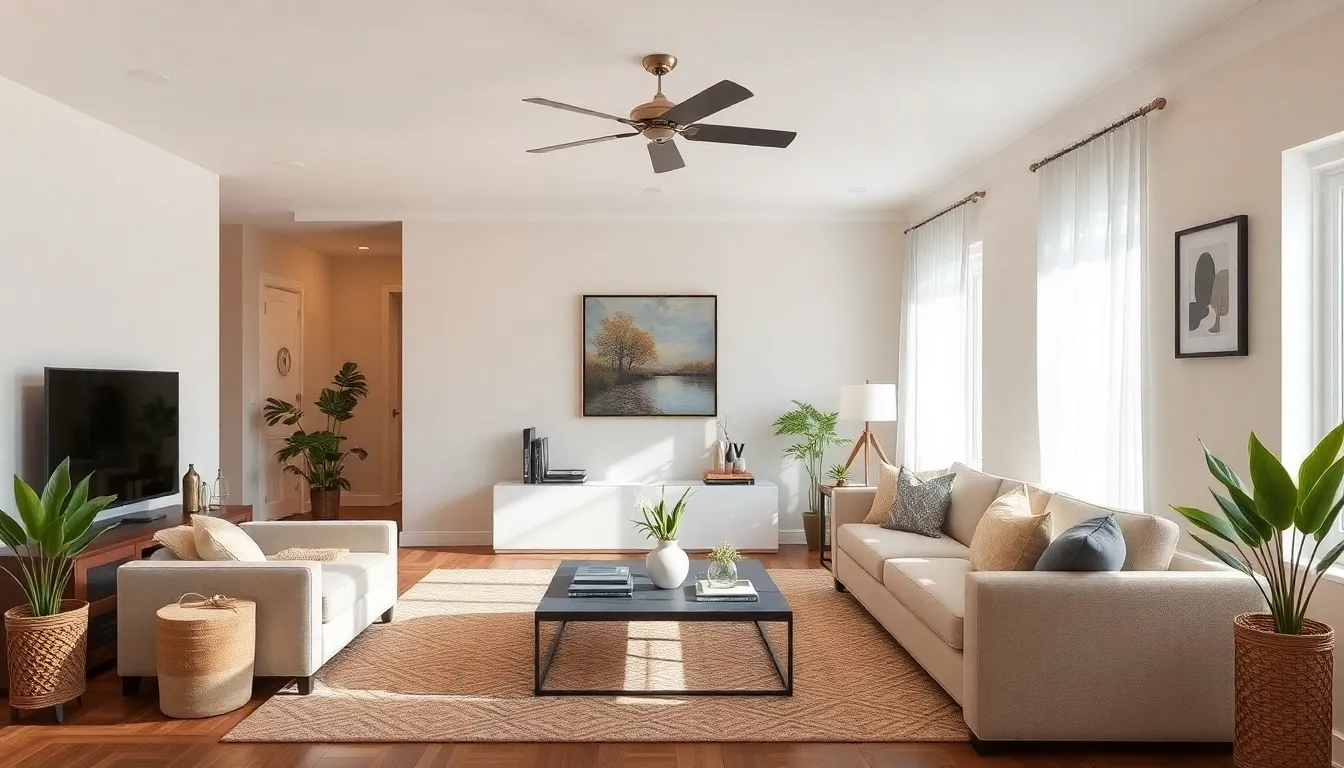Table of Contents
ToggleRenting out a house can feel like a daunting task, but it doesn’t have to be. Imagine turning your empty rooms into a cash-generating machine while you sip coffee in your pajamas. Sounds dreamy, right? With the right approach, you can transform that spare bedroom into a cozy retreat for travelers or a long-term haven for tenants—and keep your wallet happy too.
Understanding The Rental Market
Understanding the rental market is crucial for homeowners. Knowledge of current trends and pricing ensures success in renting out a property.
Researching Rental Trends
Analyzing local rental trends provides valuable insights. Resources like online rental listings and real estate reports reveal property demand and tenant preferences. Observing seasonal shifts can also highlight peak rental times. Notably, urban areas may experience different market dynamics than rural locales. Tracking these trends helps landlords adapt their strategies, ensuring competitive offerings.
Setting Competitive Rental Prices
Determining the right rental price requires careful evaluation. Comparisons to similar properties in the area help set a benchmark. Utilizing rental price calculators provides additional guidance based on features like size and location. Adjusting for amenities, such as parking or laundry, further refines pricing. Lastly, a slightly lower introductory price may attract initial tenants quickly, ensuring a shorter vacancy period.
Preparing Your House For Rent

Preparing a house for rent involves making minor repairs and enhancing overall appeal. The right steps can attract quality tenants and secure better rental prices.
Necessary Repairs and Improvements
Addressing repairs serves as the first critical step. Leaky faucets, peeling paint, and cracked tiles can deter potential tenants. Upgrading appliances boosts appeal and efficiency. Consider replacing worn-out carpets or flooring to enhance aesthetics. Additionally, ensure that all safety features, such as smoke detectors and carbon monoxide detectors, operate correctly. Improving the home’s curb appeal also matters; a well-maintained exterior invites interest.
Staging Your House Effectively
Staging transforms living spaces into attractive areas for potential renters. Neutral colors create a fresh, inviting atmosphere and help tenants visualize themselves in the space. Arranging furniture to highlight the room’s layout improves flow and function. Decluttering surfaces gives the impression of spaciousness. Adding a few tasteful decorations, such as plants or artwork, complements the home’s aesthetic appeal. Ensuring excellent lighting, both natural and artificial, enhances the environment and creates warmth. A clean, organized space leaves a lasting impression on prospective renters.
Marketing Your Rental Property
Effective marketing attracts potential tenants and maximizes rental income. Homeowners need to highlight property features and set enticing prices to stand out.
Crafting Eye-Catching Listings
Creating compelling property listings captures attention. Highlight unique features such as spacious kitchens or updated flooring. Use high-quality photos to showcase the property’s best angles. Descriptive language engages readers and sets the right expectations. Clear and concise information about the number of bedrooms, bathrooms, and additional amenities like parking spaces helps potential renters visualize living there. Including local highlights, like nearby parks or schools, enhances the property’s appeal. Engaging listings increase inquiries and streamline the renting process.
Utilizing Online Platforms
Choosing the right online platforms amplifies reach to potential renters. Popular sites such as Zillow and Apartments.com effectively showcase listings. Social media platforms also provide avenues for marketing properties. Creating a dedicated page for the rental on Facebook or Instagram can attract local interest. Optimizing listings with relevant keywords enhances visibility in search results. Regularly updating listings keeps the property prominent and engaging for viewers. Using virtual tours or video walkthroughs offers an interactive experience, increasing the likelihood of attracting quality tenants.
Managing Tenants
Managing tenants effectively ensures a smoother rental experience and maximizes income potential. Proper tenant management starts with thorough screening to select qualified individuals.
Screening Potential Tenants
Screening potential tenants involves several critical steps. Collect application forms that ask for personal details, rental history, and employment information. Run background checks to investigate credit, criminal history, and eviction records. Verify references from previous landlords, which provides insights into behavior and payment history. Asking detailed questions during interviews can also help evaluate fit. Clear communication during this process ensures expectations align for both parties.
Understanding Lease Agreements
Understanding lease agreements is vital for protecting both landlord and tenant rights. Clearly outline lease terms, including rent amount, due dates, and property rules. Include details about security deposits, maintenance responsibilities, and procedures for terminating the lease. Reviewing local laws regarding lease agreements helps ensure compliance. Discussing the lease thoroughly with tenants fosters transparency and minimizes misunderstandings. It’s important to have tenants sign the lease before they move in to formalize the agreement.
Renting out a house can be a rewarding venture that not only generates income but also maximizes the use of available space. By understanding the rental market and preparing the property effectively, homeowners can attract quality tenants and secure competitive rental prices.
Effective marketing and tenant management play crucial roles in ensuring a smooth rental experience. With the right approach and attention to detail, homeowners can turn their properties into profitable assets while enjoying the benefits of being a landlord. Embracing this opportunity can lead to long-term financial gains and a positive rental experience.




